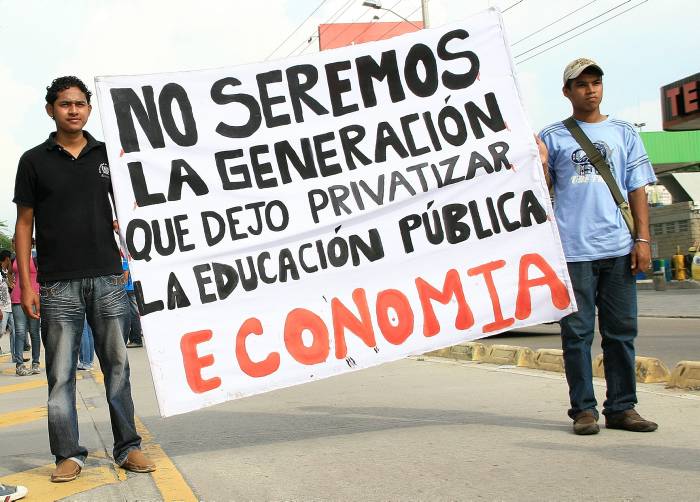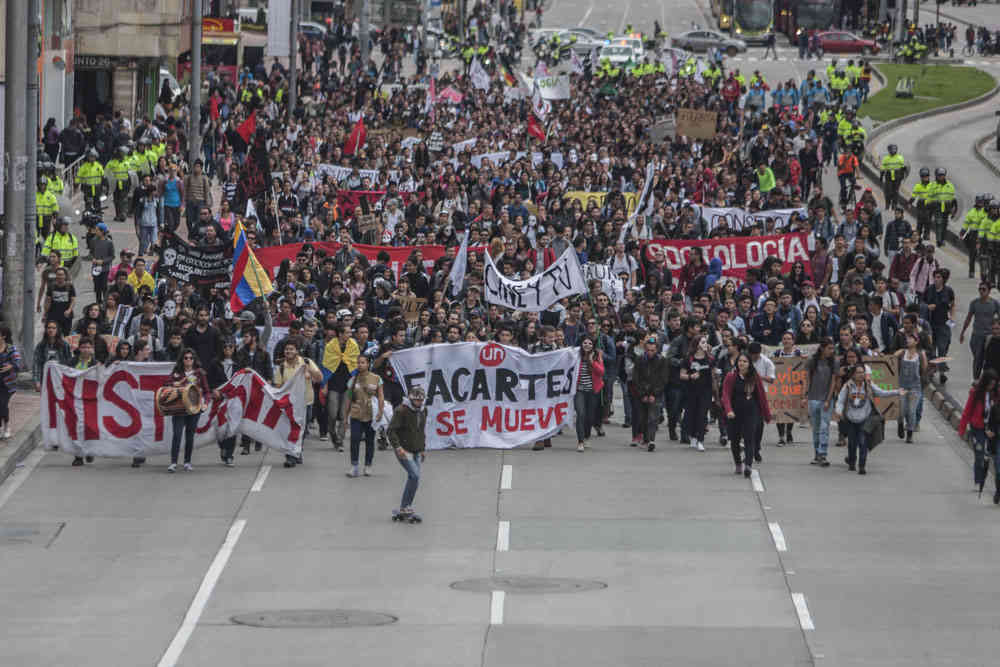Colombian students, who have united under the banner of the National Union of Students in Higher Education (UNEES), will march today alongside professors and university workers to demand that the government intervene immediately to save public higher education in the country. Many of Colombia’s best public universities are currently in extreme economic crises due to systematic budget cuts to education in general, and with the available resources being funneled to private institutions. Higher education, students claim, is being seen less as a right and more of a privilege for those who can afford to pay for it.
Students also condemned the fact that the new budget proposed by the government of Ivan Duque allocates more money towards financing the war in Colombia than to education and public institutions of higher education. This is despite Colombia’s largest guerrilla group having demobilized in 2016 and ‘peace’ being declared.
UNEES was created from a consensus decision taken at the Second National Encounter of Students in Higher Education which was held in September in the University of the Amazonia in Florencia, Caquetá. UNEES is the latest chapter in the construction of unity in the student movement and includes student organizations, federations and collectives across public and private institutions and across ideological and political lines.
During the meeting in September, students created a list of demands regarding what the government must do to save education in Colombia. They presented and filed the document with the national congress, the presidency and the ministry of finance and public credit on September 27, the government has yet to respond.
The demands include: a budget increase for institutions of public higher education in the country, the liquidation of debt for students from ICETEX (Colombian student loan institution) whose interest rates have become more of a source of profit for the State than a support to education, increase in the budget of Colciencias, a Colombian state institution that supports scientific and technological research, as well as research in areas of humanities, arts and sciences, a plan to pay the long-standing debt the State owes the public universities. And finally, the repeal of the several laws that erode public institutions and pave the way for further privatization of education in Colombia.
The last time a platform of this kind was active in Colombia was in 2011 when the Broad National Coalition of Students (Mesa Amplia Nacional Estudiantil -MANE-), a coalition of thousands of students and dozens of major organizations, mobilized against the reform to Law 30, a law which regulates higher education in the country. The reforms that were proposed to the law would have decreased the autonomy of the universities while forcing them to look for funding from private sources. Due to the mobilization by MANE, the reform to the law was withdrawn, a major victory for students in Colombia. Despite this monumental victory, the national government was able to advance in their project to privatize and weaken public higher education.

The protesting students are defending the idea that public universities are centers of critical thought and play an integral role in Colombia’s diverse social movements. They reject the idea that one studies in the university just to become a better candidate for the labor market.
The rejection of state repression of the student movement and student activists is also a major issue. In the past several years, many students from public universities who are involved in activism, both within the university and in their communities, have been victims of state repression. In 2015, 11 students and former students of Bogotá’s public universities were arrested and put in prison, initially accused of being responsible for several bombings in the city and being associated with an urban guerrilla column. During their processing hearings, it was revealed that they were actually being accused of organizing and participating in a riot that took place at the National University of Colombia in Bogotá. They were all released two months after their arrest because of irregularities in the court processing.
In 2017, following a bombing at a mall in Bogotá, the Attorney General of Colombia ordered the arrest of ten students and human rights defenders, several of whom were graduates and students of the National University of Colombia in Bogotá. The Attorney General made several statements insinuating that the public universities were where the guerrilla groups trained and recruited members. On August 24, all of those arrested in relation to the mall bombing were released.
Today, students from over 32 public and private universities, graduates, professors and many other social sectors and trade unions will take the streets across Colombia to demand that the National Government save public higher education, that it stop financing war and repression, that the public universities have the autonomy and resources to continue being centers of critical thought and innovation, and that the government respect students’ rights to mobilize and think differently.
For more info, Colombia Informa released a short video [Spanish] about the strike and student press Aula y Palabra published a long analysis on the crisis of public education in Colombia and the history of student organizing in the country.





